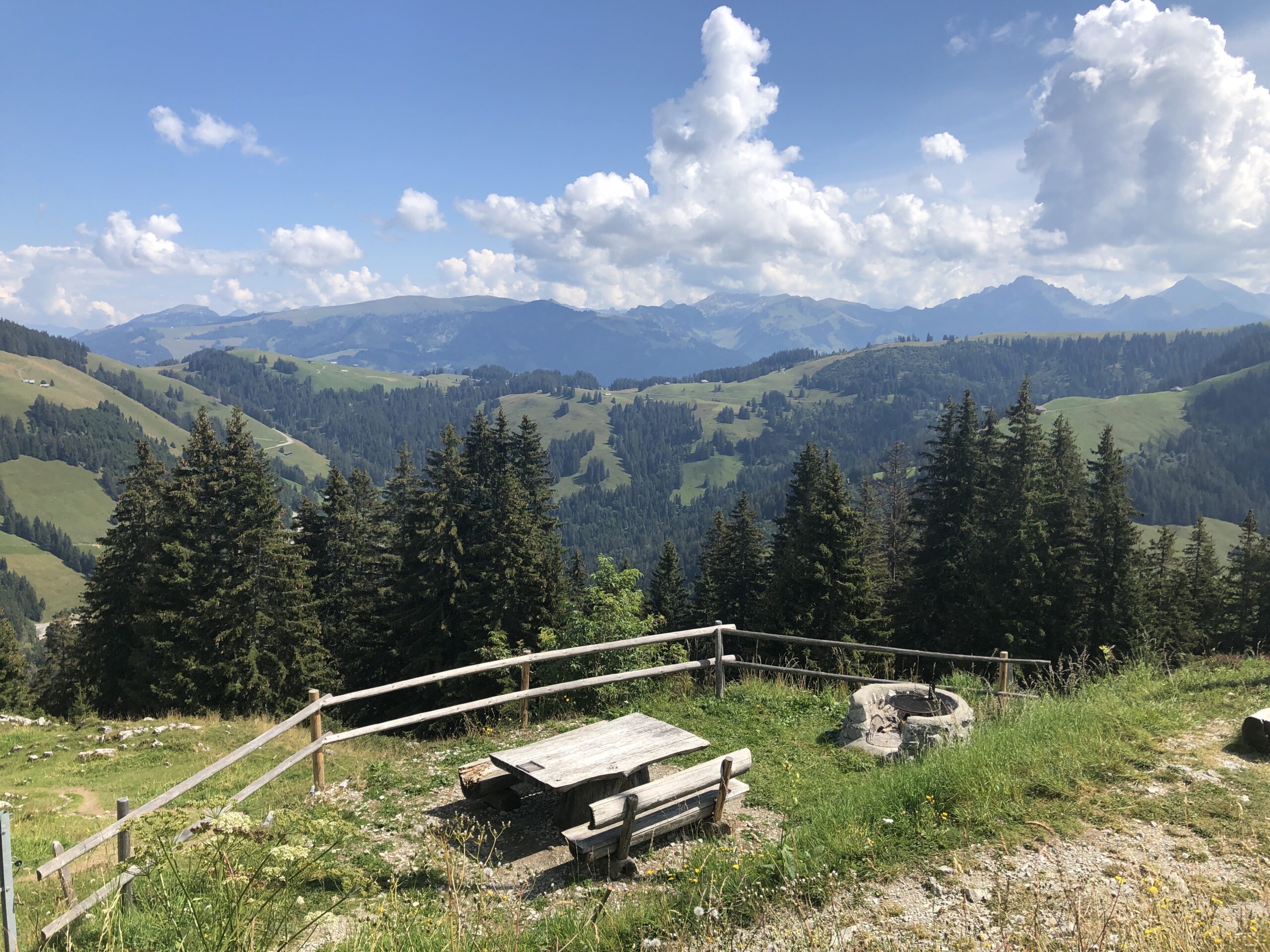
Research and teaching towards a more just and sustainable future
In the Space, Nature, and Society group (SNS), we concentrate on questions and perceptions of nature and landscapes, especially those surrounding parks, biodiversity, agriculture, conservation, and climate change. We analyze the various justifications that influence negotiations over nature and landscapes, use social theory to interrogate power dynamics inherent in these, and engage various stakeholders to find creative solutions. In this blog post we explain our aims and mission.
Transformative change through collaborative pathways
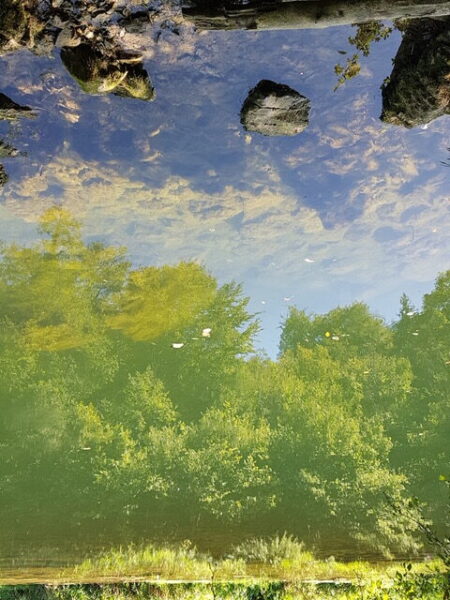
Reflexivity about water quality on the Doubs river in the Jura ©Rémi Willemin
We seek to impact policy and assist transformative change towards a more just and sustainable future, one that protects bio and bio-cultural diversity, mitigates climate change, and addresses global inequities. We do so through inter- and transdisciplinary research, teaching, and practices that are grounded in critical social science and theory. For us, transformative change is a significant, far-reaching, and future-altering paradigm shift accompanied by corresponding changes in value systems, norms, and understandings about the way the world works. We believe that transformative change begins with digging deeper into the roots, commonly referred to as ‘indirect drivers’ (IPBES 2019), of socioecological problems.
It means reevaluating and interrogating the assumptions behind the types of questions asked in sustainability studies (Ejderyan et al. 2019). It involves critically assessing the role of power in defining dominant socioecological relations (Massarella et al. 2021) and learning how to both prevent and repair damaging socioecological rifts. We understand such rifts as the erasure of the interdependency in human-human/human-nature relationships that follows the introduction of nature/culture dichotomies and hierarchies and catalyzes the normalization of environmental harm and increased inequality (see Deutsch 2018 & 2020 for example). It is something that we purposely shape by actively engaging in and encouraging diversity, equity, inclusion, and justice in the ways in which we relate to nature and each other (Boyd & Keen 2021; Beck 2020).
Because indigenous and local communities maintain collectively stored knowledge and practices that embody the transformations we seek in socioecological relations (Lam et al. 2020; Ksenofontov et al. 2019), we believe such communities must play a central role in transformative change (Shokirov & Backhaus 2020). As such, we seek to co-produce collaborative pathways toward the regeneration of healthy socioecological relations, the essential building blocks for sustainable futures.
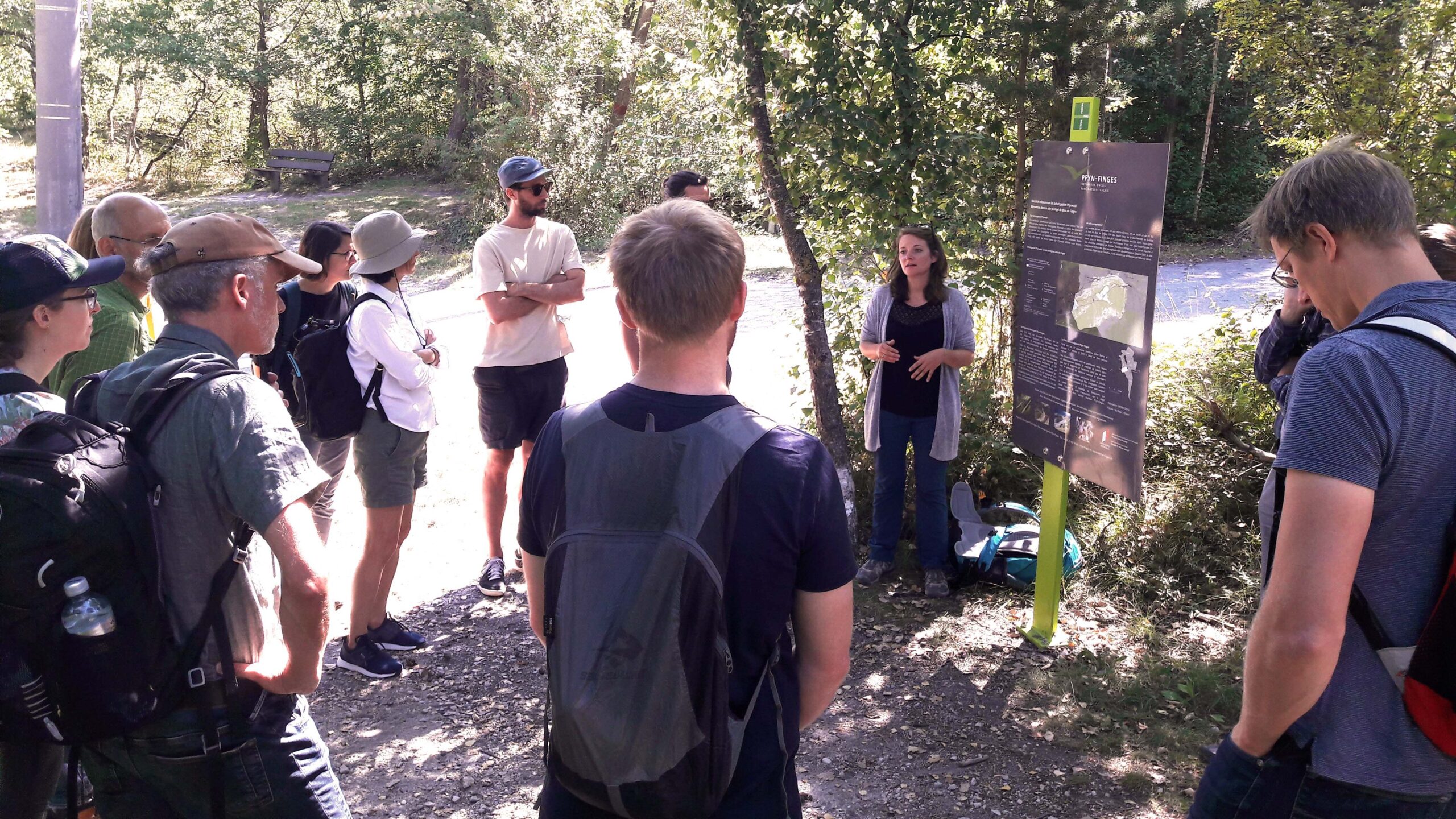
Working inter- and transdisciplinarily to co-produce future(s) we seek
Working towards transformative change requires collaborating across academic disciplines (interdisciplinarity) and with stakeholders from outside academia (transdisciplinarity) to co-produce the future(s) we seek (Willemin & Backhaus 2021, Reynard et al. 2021). It means listening to voices and perspectives previously silenced as well as challenging, reimagining, and recreating the status quo in a pluralistic and just way.
As an interdisciplinary group with transdisciplinary backgrounds, we in SNS rely on each other and combine our strengths and experiences from academic, non-profit, and government work, to collectively draw on our knowledge of the natural and social sciences, as well as natural resource policy, management, and law, when approaching real-world problems.
For example, Roger Keller and Norman Backhaus – together with colleagues from University of Lausanne – have worked with the “landscape services” approach at different study sites in Switzerland to describe desired landscape qualities of local stakeholders. Through this process, bottom-up initiatives have emerged which aimed at improving awareness about the “values” of landscapes for the local communities (Keller & Backhaus 2020).
In another project, Mollie Chapman engages with farmers in the Swiss Alps in order to understand their “relational values”. Relational values concern the ways that nature matters to people based on our relationships with natural entities and with each other within nature (Chan et al 2016; Deplazes-Zemp & Chapman 2020). Similarly, Rémi Willemin discusses probable and desired futures with farmers and beekeepers in the Swiss Jura mountains (Willemin & Backhaus 2021).
Beyond our research, this collective knowledge also informs our teaching philosophy, which is focused on actively engaging students in the learning process, encouraging them to embrace multiple and different perspectives, and offering them tools to effect meaningful change.
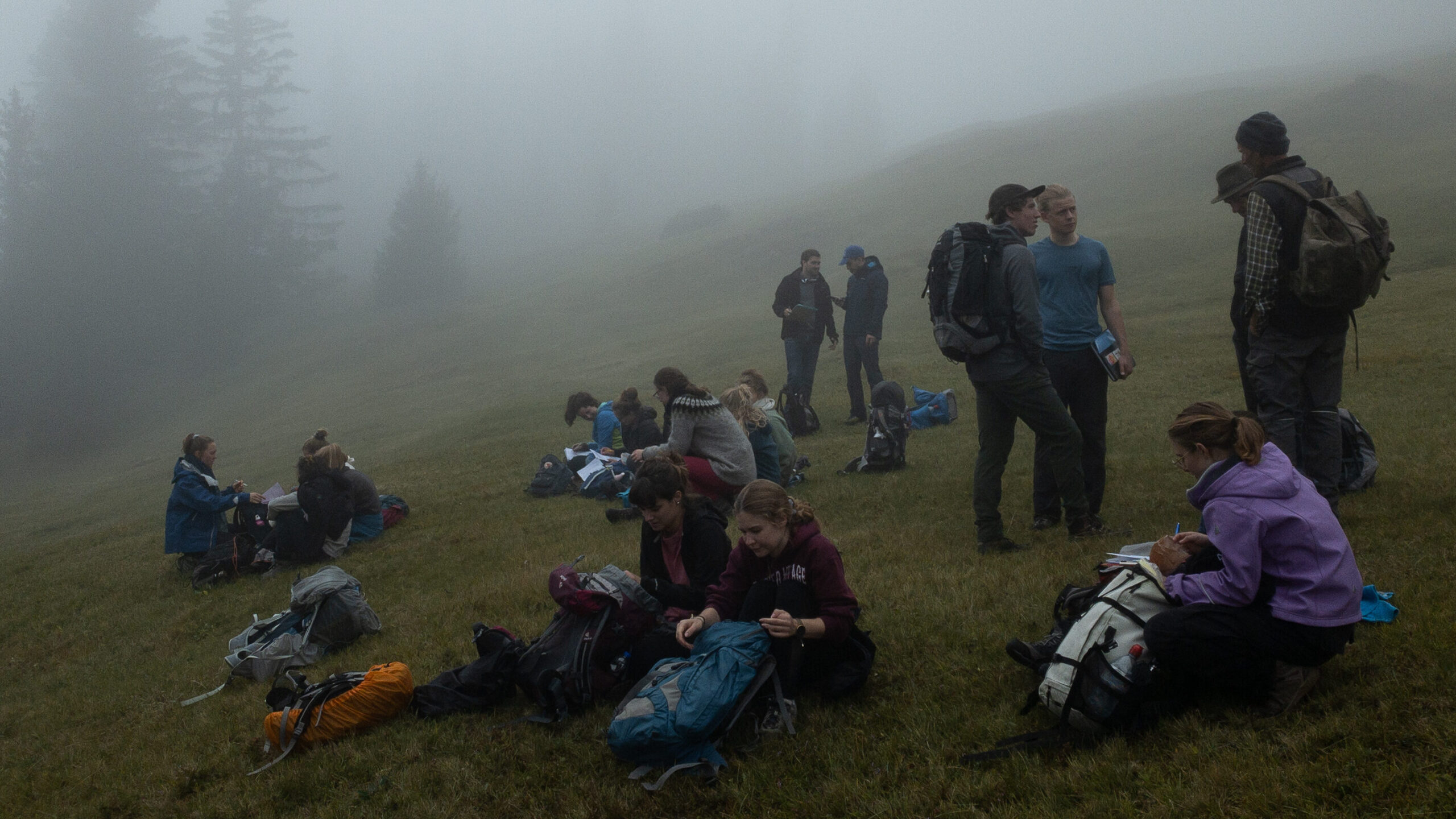
Using Critical Social Science to get to the core of the problem(s)
Key for us is the use of critical social science and theory in transformative change. Typically, when social science is enlisted for informing environmental policy, the expectation is that social science can help to understand and change values (Manfredo et al. 2017) and behaviors in relation to specific environmental problems (Ejderyan et al. 2019 and in our own personal experience, and those of our peers). For us, such an approach frequently fails to acknowledge systems of injustice and even often reinforces these by placing the burden of change on individuals and thus shifting the focus away from the systemic causes. We thus use our knowledge and experience to deconstruct socioecological problems, that is, to trace such problems back to the power dynamics and politics at their core. This not only allows for more just solutions by shifting the blame off (usually marginalized) individuals, but also for a broader and deeper understanding of the causes of, and hence the potential of solutions for, socioecological problems.
For example, Sierra Deutsch has shown how assigning a financial value to the Irrawaddy dolphin in a Cambodian conservation project has led to an exacerbation of socioecological issues in the area – including increases in social inequality, crime, and deforestation – while making the dolphin problem worse (Deutsch 2018). To analyze and understand how this happened, Sierra examines the project, contrasting it with another more successful one in Myanmar, within the context of global neoliberalization (i.e. in simplest terms, the trend toward reliance on the market to regulate all socioecological interactions) (Deutsch 2020). Mollie Chapman has also examined financial incentives in conservation, showing the value systems underlying conflicts over incentive programs (Chapman et al 2019, 2020a) or the ways that local actors can re-interpret such programs (Chapman et al 2020b).
Different and at times conflicting values have also been part of Annina Michel’s work. She analyzes how different senses of justice inform protected area negotiations (Michel 2019, Michel and Backhaus 2019), and how rational trust can influence participatory processes in contemporary conservation projects (Michel et al. 2021). Furthermore, we not only engage with participation processes empirically, but seek to explore participatory methods such as participatory mapping, as illustrated by the work of Stefanie Müller (Müller, Backhaus & Buchecker 2020) and our ongoing research project ValPar.CH.
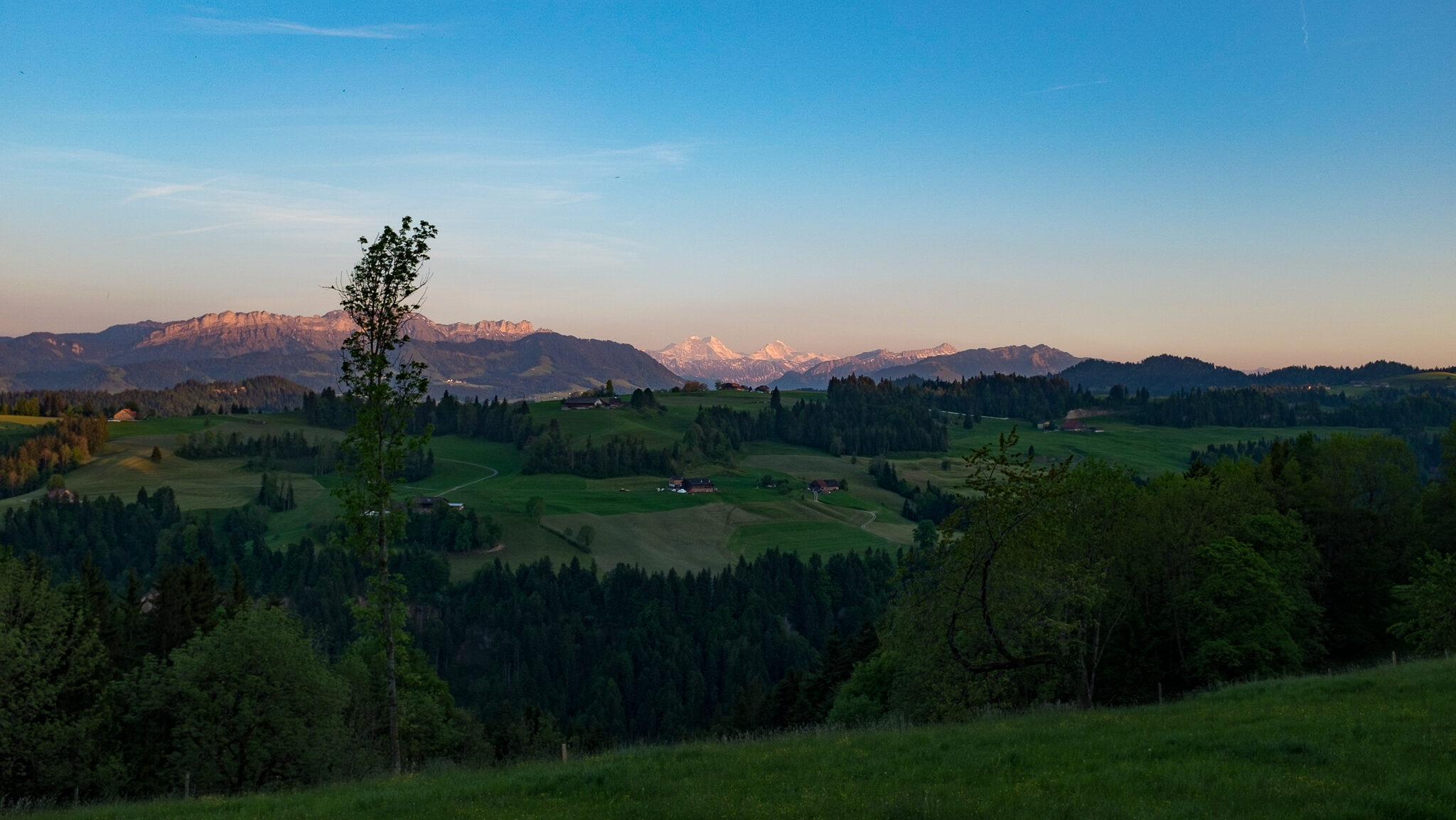
Research Unit Space, Nature, and Society
References
Beck, S., & Forsyth, T. (2020). Who gets to imagine transformative change? Participation and representation in biodiversity assessments. Environmental Conservation, 47(4), 220-223.
Boyd, D. R., & Keene, S. (2021). Policy Brief No. 1 Human rights-based approaches to conserving biodiversity: equitable, effective and imperative. United Nations Human Rights special procedures.
Chan, K. M. A., Balvanera, P., Benessaiah, K., Chapman, M., Díaz, S., Gómez-Baggethun, E., et al. (2016). Opinion: Why protect nature? Rethinking values and the environment. Proc Natl Acad Sci, 113(6), 1462–1465.
Chapman, M., Satterfield, T., & Chan, K. M. A. (2019). When value conflicts are barriers: Can relational values help explain farmer participation in conservation incentive programs? Land Use Policy, 82, 464–475.
Chapman, M., Satterfield, T., & Chan, K. M. A. (2020a). How value conflicts infected the science of riparian restoration for endangered salmon habitat in America’s Pacific Northwest: Lessons for the application of conservation science to policy. Biological Conservation, 244, 108508.
Chapman, M., Satterfield, T., Wittman, H., & Chan, K. M. A. (2020b). A payment by any other name: Is Costa Rica’s PES a payment for services or a support for stewards? World Development, 129, 104900.
Deplazes-Zemp, A., & Chapman, M. (2020). The ABCs of Relational Values: Environmental Values That Include Aspects of Both Intrinsic and Instrumental Valuing. Environmental Values, 1–26.
Deutsch, S. (2018). Uneven development and shifting socioecological rifts: Some unintended consequences of dolphin conservation in Cambodia. Socius: Sociological Research for a Dynamic World, 4.
Deutsch, S. (2020). «Who doesn’t like dolphins?!» Neoliberalization, variegated environmentalities, and value alterations in a cross-national comparison of Irrawaddy dolphin conservation. Geoforum, 114: 159-171.
Ejderyan, O., Schneider, F., Bornemann, B., & Kläy, A. (2019). How social sciences and humanities can contribute to transformative science. GAIA-Ecological Perspectives for Science and Society, 28(2), 160-162.
Keller, R., & Backhaus, N. (2020). Integrating landscape services into policy and practice – a case study from Switzerland. Landscape Research, 45(1), 111-122.
Ksenofontov, S., Backhaus, N., & Schaepman-Strub, G. (2019). ‘There are new species’: indigenous knowledge of biodiversity change in Arctic Yakutia. Polar Geography, 42(1), 34-57.
IPBES. (2019). Global assessment report of the Intergovernmental Science-Policy Platform on Biodiversity and Ecosystem Services. Bonn, Germany: IPBES Secretariat. ISBN: 978-3-947851-20-1.
Lam, D., E. Hinz, D. Lang, M. Tengö, H. von Wehrden, & B. Martín-López. (2020). Indigenous and local knowledge in sustainability transformations research: a literature review. Ecology and Society 25(1):3.
Manfredo, M. J., Bruskotter, J. T., Teel, T. L., Fulton, D., Schwartz, S. H., Arlinghaus, R., et al. (2017). Why social values cannot be changed for the sake of conservation. Conservation Biology, 31(4), 772–780.
Michel, A. H. (2019). How conceptions of equity and justice shape national park negotiations: The case of Parc Adula, Switzerland. eco.mont (Journal on Protected Mountain Areas Research), 11(1), 25-31.
Michel, A. H., & Backhaus, N. (2019). Unravelling Reasons for the Non-Establishment of Protected Areas: Justification Regimes and Principles of Worth in a Swiss National Park Project. Environmental Values 28: 171-190.
Michel, A.H., Pleger, L. E., von Atzigen, A. Bosello, O., Sager, F., Hunziker, M., Graefe, O., Siegrist, D., & Backhaus, N. (2021). The Role of Trust in the Participatory Establishment of Protected Areas—Lessons Learnt from a Failed National Park Project in Switzerland. Society & Natural Resources:Epub ahead of print.
Müller, S., Backhaus, N., & Buchecker, M. (2020). Mapping meaningful places: A tool for participatory siting of wind turbines in Switzerland? Energy Research & Social Science, 69, 101573.
Reynard, E., Grêt-Regamey, A., & Keller, R. (2021). The ValPar.CH project – Assessing the added value of ecological infrastructure in Swiss Parks. Eco.mont, 13(2):64-68.
Shokirov, Q., & Backhaus, N. (2020). Integrating hunter knowledge with community-based conservation in the Pamir Region of Tajikistan. Ecology and Society, 25(1).
Willemin, R., & Backhaus, N. (2021). Future waterscapes of the Swiss Jura: using speculative photo-response fabulation techniques with farmers. Geographica Helvetica, 76(2), 147-158.
Team Space, Nature, and Society: Sierra Deutsch, Annina Michel, Roger Keller, Norman Backhaus, Mollie Chapman and Rémi Willemin
